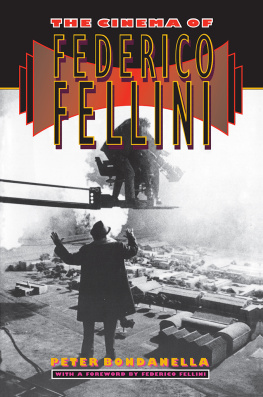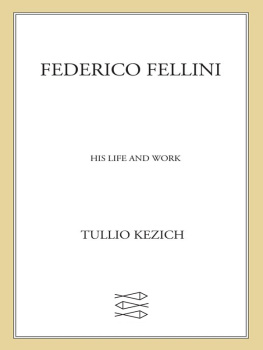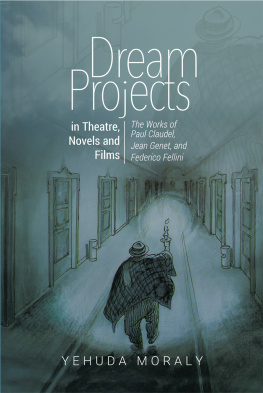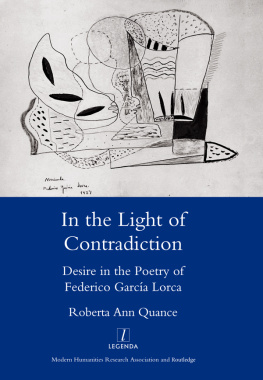Peter Bondanella - The Cinema of Federico Fellini
Here you can read online Peter Bondanella - The Cinema of Federico Fellini full text of the book (entire story) in english for free. Download pdf and epub, get meaning, cover and reviews about this ebook. year: 2020, publisher: Princeton University Press, genre: Detective and thriller. Description of the work, (preface) as well as reviews are available. Best literature library LitArk.com created for fans of good reading and offers a wide selection of genres:
Romance novel
Science fiction
Adventure
Detective
Science
History
Home and family
Prose
Art
Politics
Computer
Non-fiction
Religion
Business
Children
Humor
Choose a favorite category and find really read worthwhile books. Enjoy immersion in the world of imagination, feel the emotions of the characters or learn something new for yourself, make an fascinating discovery.
- Book:The Cinema of Federico Fellini
- Author:
- Publisher:Princeton University Press
- Genre:
- Year:2020
- Rating:3 / 5
- Favourites:Add to favourites
- Your mark:
- 60
- 1
- 2
- 3
- 4
- 5
The Cinema of Federico Fellini: summary, description and annotation
We offer to read an annotation, description, summary or preface (depends on what the author of the book "The Cinema of Federico Fellini" wrote himself). If you haven't found the necessary information about the book — write in the comments, we will try to find it.
The Cinema of Federico Fellini — read online for free the complete book (whole text) full work
Below is the text of the book, divided by pages. System saving the place of the last page read, allows you to conveniently read the book "The Cinema of Federico Fellini" online for free, without having to search again every time where you left off. Put a bookmark, and you can go to the page where you finished reading at any time.
Font size:
Interval:
Bookmark:

The Cinema of
FEDERICO FELLINI
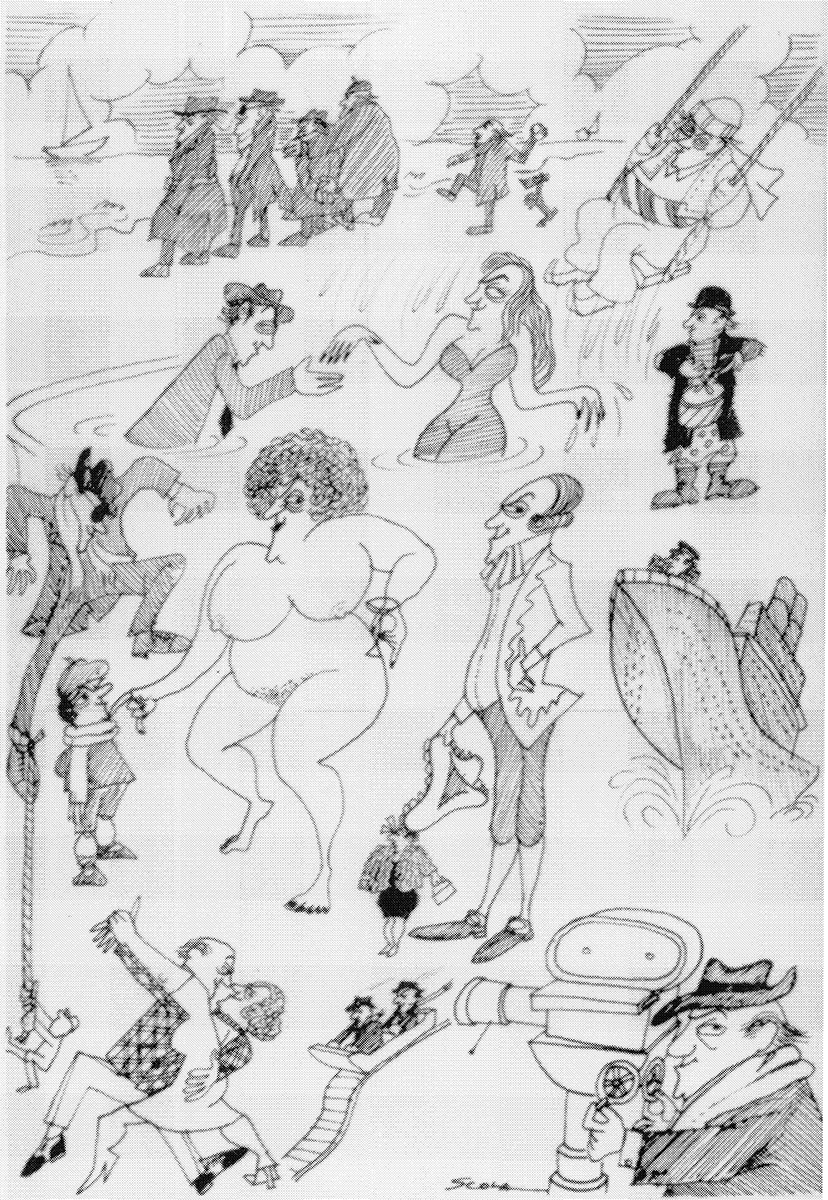
The Cinema of ___________
FEDERICO FELLINI
PETER BONDANELLA
WITH A FOREWORD BY
Federico Fellini ___________
PRINCETON UNIVERSITY PRESS
PRINCETON, NEW JERSEY
Copyright 1992 by Princeton University Press
Published by Princeton University Press,
41 William Street, Princeton, New Jersey 08540
In the United Kingdom: Princeton
University Press, Chichester, West Sussex
All Rights Reserved
Library of Congress Cataloging-in-Publication Data
Bondanella, Peter E., 1943
The cinema of Frederico Fellini / by Peter Bondanella.
p. cm.
Includes bibliographical references and index.
ISBN 0-691-03196-7ISBN 0-691-00875-2 (pbk.)
1. Fellini, FredericoCriticism and interpretation. I. Title.
PN1998.3.F45B66 1992
791.43'0233'092dc20 91-25873
Frontispiece: Black-and-white drawing of Fellini playing all his major characters by Ettore Scola
eISBN: 978-0-691-22304-9
R0
For Gianfranco and Sergio
ILLUSTRATIONS
Frontispiece
FOREWORD
T HE CINEMA, at least here in Italy, has been reduced to a mere pretext for filling two hours of entertainment on commercial television with an unrecognizable pap of cinematic images chopped up by commercial spots.
How could anyone imagine, therefore, that books could still be devoted to films butchered in such a fashion? It seems like a dream from another era, and yet, here it is: making his way with difficulty through detergents and diapers, somebody with good will, competence, and love still exists who succeeds in reconstructing the parts of a work of artistic expression by accomplishing a heroic enterprise not unlike that of someone who pieces together a book by picking up off the street pages that have been torn out and scattered about.
The most exciting aspect of Bondanella's work is, in fact, his inextinguishable faith in the power of reason and systematization which reminds us in a nostalgic way of methods and choices inspired by respect and harmony. Without a doubt, the fact that Bondanella is an American provides him with enormous support in his activity as historian and critic, to which he devotes himself with that sense of pragmatic mysticism which has carried the nation to which he belongs to the highest technological achievements, enabling America to claim a place for herself, and not only just of late, as the custodian and repository of Western culture.
Surely in America things are very different if the legendary Japanese director Kurosawa succeeds in realizing his dreams protected by the magic shield of Spielberg and Lucas, glorious samurai of that cinema which transforms films into millions and millions into films, following the simplest formula of allthat is, to love one's work and to enjoy doing it. A book like the one Bondanella has written can be planned, born, and brought into being only in contexts that possess an indestructible faith in their own health and have not been undermined by years of protests, negations, acts of arrogance, and "periods of crisis," as we say in a phrase that explains both everything and nothing and is, therefore, adopted by everyone without explanation or the acceptance of responsibility.
Bondanella's book treats the cinema of a European director, and this, too, is an even more obvious sign of a vitality that ignores geographical boundaries and helps to unite two realities that, however historically or culturally different they may be, can nevertheless live together and coexist, drawing nourishment from a single expressive Utopia. And then the fact that Bondanella treats primarily my own films suggests to me once again the sense of uneasiness and embarrassment I always experience when I feel myself being analyzed, diagnosed, and synthesized into fixed attitudes and expressions set in stone, rather reminiscent of a funeral, which I immediately feel overwhelmed by the desire to contradict and to deny in the attempt to extract myself from the paralysis of such an act of intellectual sorcery.
But I am also invited to write a few prefatory pages. Another serious embarrassment: to put myself in the position of the judge, the one who confirms and grants approval and blessings? Here I am overcome by that uncomfortable sensation experienced by the most undisciplined schoolboy who has been brought before his headmaster, before authority, feeling an irresistible desire to run away and to make funny faces.
The only inclination I recognize in myself is perhaps that of being able, on some occasions and in a rather confused manner, to bear witness solely to myself and to those few things I seem to understand, while refusing as long as I possibly can to venture out into other territories, theoretical systems, generalizations. I do not possess such qualities, and in order to write about this book, I should be both a critic and a historian, roles and tasks that really do not suit me. Bondanella's conclusions and proposals will serve to nourish, independently of what I could write, an analytical discourse and a speculative dialectic that will, if nothing else, help to place the cinema in its true light among the arts.
A professor of Italian literature, translator of our literary classics, an attentive commentator and observer of our history, Bondanella is a scholar of our political and social behavior, but above all else, of our artistic expression, knowing and loving as few others do the fresco paintings he tirelessly seeks out in the most remote little churches of our country. I also want to add that our author is a scientific philologist and that everything he describes or to which he refers rests upon serious affirmations and reflects well-prepared arguments according to a procedure that excludes every kind of digression, even that which might be suggestive from a literary point of view. His long, tenacious training has ultimately brought him to devote himself, with extraordinary preparation and enthusiasm, to Italian cinema and subsequently to my films, and now in this book once again to my films, as he offers an unrelenting examination of them. I know that in Italy he has spent weeks and weeks in screening rooms seeing them over and over again, and that he has also read everything written by others about my work. Not only that, but he has succeeded in meeting almost all those people who, for one reason or another, since they had belonged to my film crews, he felt could help him in writing his critical mosaic, seeking them out and collecting, with a faith that never failed him, testimonials, data, reports, and documents. Only from me did he receive very little, almost nothing.
And so now in front of this huge book that bears witness to his labor and love, I should feel a bit of remorse, but, instead, I believe that this situation has been beneficial to him, for while, and with every right, Bondanella hoped to obtain revelations and confidences, my evasions and my silences have forced him to search elsewhere and among other people, recovering old scripts and notebooks where a little drawing was sketched out with the outline of a dialogue, and where spots of color suggested the tones of a scene. And in this fashion, explorer, archeologist, bloodhound, and detective, he has gathered together notebooks, photographs, and scribblings, and he has carried this booty back to the archives of his university in a huge suitcase.
Generous America! Tenaciously optimistic and heedful, she has for some time been supplanting us, just like those provident children who show themselves wiser and more sensible than their reckless fathers.
Font size:
Interval:
Bookmark:
Similar books «The Cinema of Federico Fellini»
Look at similar books to The Cinema of Federico Fellini. We have selected literature similar in name and meaning in the hope of providing readers with more options to find new, interesting, not yet read works.
Discussion, reviews of the book The Cinema of Federico Fellini and just readers' own opinions. Leave your comments, write what you think about the work, its meaning or the main characters. Specify what exactly you liked and what you didn't like, and why you think so.

